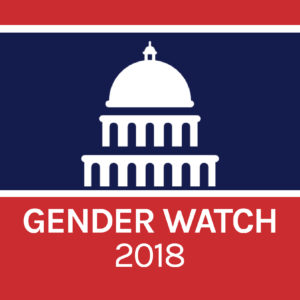Four primaries were held on Tuesday in Kansas, Michigan, Missouri, and Washington. Full results, including candidate lists, summaries, and historical comparisons, are available via the Center for American Women and Politics’ (CAWP) Election Watch page.
Among the most notable results for women:
- Women broke the records for women major party nominees for the U.S. House and governor on August 7th, according to CAWP data.
- At least 23 (17D, 6R) women won U.S. House nominations on Tuesday, bringing the total number of women nominees in election 2018 to 185. The previous record for women U.S. House nominees was 167, set in 2016. As of Wednesday afternoon, 3 (3D) women candidates are in races too close to call.
- 2 women won Democratic nominations for governor on Tuesday, bringing the total number of women gubernatorial nominees to 11 (8D, 3R) this year. The previous record for women gubernatorial nominees was 10, set in 1994 and tied in 2002, 2006, and 2010.
- With her win in the general election primary for Michigan’s 13th congressional district – where she is currently unopposed this fall, Rashida Tlaib (D) is likely to become the first Muslim woman in Congress.* She is one of two non-incumbent women of color nominated for the U.S. House across the August 7th primary states. Sharice Davids (D) will be the Democratic nominee in Kansas’ 3rd congressional district, which currently leans Republican. If elected, she would be among the first Native American women (with New Mexico’s Democratic nominee Deb Haaland) elected to Congress.
- All 8 (4D, 4R) women House incumbents who competed in Tuesday’s primaries advanced to the general election and are currently favored to win re-election this fall. Of the 15 (13D, 2R) non-incumbent women already advancing, 4 (3D, 1R) are in contests that are currently rated as toss-ups or that favor her party. The remaining 11 (12D, 1R) non-incumbent women who won on Tuesday are running in districts that currently favor their opponents.
- All 3 (3D) women Senate incumbents who competed in Tuesday’s primaries advanced to the general election and are currently favored to win re-election this fall.
- Four general election contests for the U.S. House and one general election contest for the U.S. Senate in Kansas, Michigan, Missouri, and Washington will be all-female this fall. After Tuesday’s primaries, the total number of all-female congressional contests (U.S. House and Senate combined) is 25, a record high.
- Both Michigan and Kansas have the potential to elect women governors, though the Kansas race is currently rated as favoring the Republican.
* Tlaib also ran for the 13th district special election to complete Conyers’ term until January. Brenda Jones (D) won that race, positioning her to serve in Congress for the remainder of Conyers’ term, despite Tlaib earning the nomination for a new term starting in January 2019.
US House
- 23 (17D, 6R) of 40 (57.5%) women candidates for the U.S. House in KS, MI, MO, and WA won their primary bids for office on August 7th and 3 (3D) women are in races that are too close to call as of this posting.
- 17 of 30 (57%) Democratic women and 6 of 10 (60%) Republican women candidates for the U.S. House already advanced to the general election.
- Women are 23 of 67 (34.3%) of the major party candidates who have already advanced in U.S. House races from these states as of Wednesday morning, including 17 of 34 (50%) Democrats and 6 of 33 (18.2%) Republicans. Multiple House contests remain too close to call as of Wednesday afternoon.
- All 8 (4D, 4R) women incumbents advanced to the general election for re-election in Kansas, Michigan, Missouri, and Washington; all will run in districts where they are favored for re-election, though the latest Cook Political Report show’s Representative Cathy McMorris Rodgers’ (R-WA) district as only leaning Republican.
- At least 11 women nominees, all Democrats, will run as challengers to incumbents, with all but one running in districts that favor their opponents.
- At least 4 (2D, 2R) women will advance to general election contests for open seats; Rashida Tlaib (D) is favored to win in MI-13, while Candius Stearns’ (R) opponent is favored in MI-09. A woman is assured to win in MI-11, where both major party nominees are women.
- Of the 23 women primary winners already decided for the U.S. House in KS, MI, MO, and WA, 5 (24%) are women of color. They include: 1 (1D) Black woman; 1 (1R) Latina; 1 (1D) Asian woman; 1 (1D) Arab-American woman; and 1 (1D) Native American woman. Only two non-incumbent women of color were nominated for the U.S. House across the August 7th primary states, including Rashida Tlaib (D) – favored to win in Michigan’s 13th congressional district to become the first Muslim woman in Congress – and Sharice Davids (D) – running to be among the first Native American women in Congress (with New Mexico nominee Deb Haaland) in a race that currently favors her opponent.
- Across these 4 states there will be at least 4 all-female contests for the U.S. House in MO-04, MI-11, WA-03, and WA-05.
US Senate
- 8 (5D, 3R) women competed for U.S. Senate on August 7th in Michigan, Missouri, and Washington, including incumbent Senators Debbie Stabenow (D-MI), Claire McCaskill (D-MO), Maria Cantwell (D-WA). Stabenow was uncontested in her bid for re-election, while McCaskill and Cantwell advanced to the general election amidst crowded primaries. Senator Cantwell will be challenged by another woman – Republican Susan Hutchison – in Washington’s U.S. Senate race.
- 4 (2D, 2R) women candidates were defeated in their bids for the U.S. Senate on Tuesday.
Statewide Elected Executive Office (including Governor)
- Both women who ran for governor on August 7th were successful. Laura Kelly (D-KS) and Gretchen Whitmer (D-MI) will be on the ballot this November.
- Of the 9 (4D, 5R) women who competed for statewide elected executive offices other than governor in Kansas and Missouri, 5 (3D, 2R) (55.6%) won nominations on August 7th.
- None of the women nominees for statewide executive office across these states are women of color.
Kansas
U.S. House
Women are 1 of 8 (12.5%) major party nominees for U.S. House in Kansas. 3 (2D, 1R) women were unsuccessful in their bids for U.S. House nominations this year. If Sharice Davids (D) is unsuccessful in KS-03, Kansas will have an all-male congressional delegation in 2019. Currently, 1 (1R) woman represents Kansas in Congress; U.S. Representative Lynn Jenkins (R) did not run for re-election this year.
Statewide Elected Executive Office (including Governor)
Women currently hold 0 of 6 statewide elected executive offices in Kansas. This year, 4 of 12 (33.3%) major party nominees for statewide executive offices in Kansas are women, including 3 of 3 of 6 (50%) Democratic and 1 of 6 (16.7%) Republican nominees.
- Laura Kelly won the Democratic nomination for governor of Kansas. If successful in November, she would be the third woman governor of Kansas.
4 (1D, 3R) women were defeated in their primary bids for statewide executive office in Kansas.
Michigan
U.S. House
Women are 10 of 26 (38.5%) major party nominees for U.S. House in Michigan, including 2 of 13 (15.4%) Republicans and 8 of 13 (61.5%) Democrats. 5 (5D) women House candidates were unsuccessful.
- Both women incumbents (2D) will run for re-election this fall in districts in which they are favored to win.
- 4 (4D) women nominees will challenge Republican incumbents this fall; 3 are running in districts that favor their opponents and Elissa Slotkin (D) is competing against Representative Mike Bishop in a contest currently deemed a Republican toss-up by Cook Political Report.
- At least 4 (2D, 2R) women nominees will compete for open seats; Democrat Rashida Tlaib is unopposed in her general election bid in Michigan’s 13th congressional district and Republican Candius Stearns is running in the solidly Democratic 9th congressional district. Tlaib will be the first Muslim woman in Congress. A woman is also assured to win in MI-11, where both major party nominees are women.
Of the 8 women nominees already selected in Michigan, 2 are women of color, including incumbent Brenda Lawrence (D), who is Black, and Rashida Tlaib (D), who is Palestinian-American and Muslim.
U.S. Senate
Incumbent Senator Debbie Stabenow, the only woman candidate for U.S. Senate this year and the only woman to serve in the U.S. Senate from Michigan, was unopposed in the Democratic primary. She is favored in her bid for re-election in November.
Governor
Gretchen Whitmer, the only woman candidate for governor this year, defeated two male opponents to win the Democratic gubernatorial nomination in Michigan. If successful in November, she would be the state’s second woman governor.
Statewide executive offices other than governor are selected via party convention in Michigan.
Missouri
U.S. House
Women are 5 of 16 (31.3%) major party nominees for U.S. House in Missouri, including 3 of 8 (37.5%) Democrats and 2 of 8 (25%) Democrats. 5 (2D, 3R) women House candidates were unsuccessful.
- Both women incumbents – Republicans Ann Wagner and Vicki Hartzler – advanced to the general election in contests where they are strongly favored for re-election. Wagner will be challenged by another woman, Renee Hoagenson, in Missouri’s 4th congressional district.
- 2 more women nominees – both Democrats – will run as challengers to Republican incumbents in districts that favor their opponents.
Missouri has never sent a woman of color to the U.S. Congress and that will remain unchanged in 2019. None of the women nominees for the U.S. House or U.S. Senate in Missouri this year are women of color.
U.S. Senate
Incumbent Senator Claire McCaskill (D) won the Democratic nomination for U.S. Senate in Missouri. She will be challenged by Josh Hawley (R) in a contest currently rated as a toss-up by Cook Political Report. Four (2D, 2R) women were defeated in their bids for U.S. Senate nominations.
Statewide Elected Executive Office
The only statewide executive election in Missouri this year will be all-female. Both women candidates for state auditor won their party’s nomination, yielding a general election contest between incumbent State Auditor Nicole Galloway (D) and Republican challenger Saundra McDonald (R).
Washington
U.S. House
Women are 7 of 17 (41.2%) candidates already advancing to the general election for U.S. House in Washington. Three (3D) women candidates are in races too close to call as of Wednesday morning. One (1D) women House candidate was defeated thus far.
- All 4 women incumbents – Republicans Cathy McMorris Rodgers and Jaime Herrera Beutler, and Democrats Suzan DelBene and Pramila Jayapal – advanced to the general election in contests where they are favored for re-election. Both McMorris Rodgers and Herrera Beutler will be challenged by women Democrats in the general election in Washington’s 3rd and 5th congressional districts, respectively.
- 1 (1D) more woman nominee will run as challenger to a Republican incumbent favored to win in Washington’s 4th congressional district.
- No Republican non-incumbent candidates advanced to the general election.
U.S. Senate
Incumbent Senator Maria Cantwell (D) advanced to the general election for U.S. Senate in Washington. She will be challenged by another woman – Susan Hutchison (R) – in a contest that strongly favors the incumbent. Cantwell and Hutchison were the only 2 major party candidates for the U.S. Senate in a field of 18.


 From March to December 2018, the
From March to December 2018, the 